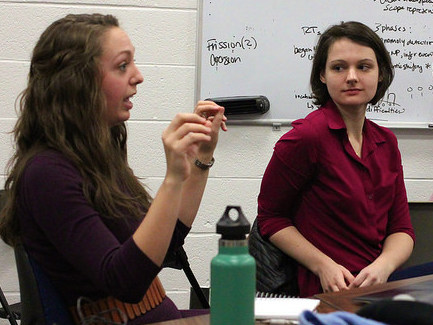Language Science, Policy and Advocacy: Alia Lancaster Making our CASE at AAAS
June 17, 2015
Maryland Language Science Center

Alia Lancaster , graduate student in Second Language Acquisition and a research assistant at CASL , is leading the way for language science students' involvement in public policy and science advocacy. This Spring she was selected to participate in a 3-day training event organized by the American Association for the Advancement of Science (AAAS) entitled Making our CASE: Catalyzing Advocacy in Science and Engineering . The workshop, first held in 2014, gives graduate students an opportunity to learn about the organization of Congress, the federal budget and appropriations process - as well as about effective science communication and civic engagement. The workshop participants heard from an array of speakers from AAAS, government relations firms, science advocacy groups, the US Office of Science and Technology Policy (a White House division), as well as congressional staffers with various roles in the House and Senate. The sessions addressed government processes relevant to advocating for science, careers in science policy, and strategies for communicating effectively to politicians and the general public about science. Alia first heard about the workshop this January during Winter Storm , when she also attended the panel on non-academic careers. “I knew that was an option I wanted to pursue. … The panelists mentioned that learning about and/or trying a number of things during graduate school is one way to know what type of non-academic job is right for your interests and strengths. I had seen the research-focused types of jobs at CASL, so I thought that policy might be another arena I should explore.” Alia reports that the workshop gave her a good understanding of what science policy careers might look like, but more generally an appreciation of how and why to get involved in science policy and advocacy: “As a behavioral/social science, language science comes under more and more funding pressures. So we need more advocates who know first-hand about the research!” On the last day of the workshop, Alia had the chance to put some of the skills she had learned into practice and met with the legislative assistant of Congresswoman Donna Edwards , telling her about the breadth of language research going on at Maryland. Alia’s experience and views on the AAAS training provide valuable input for planning the policy experiences which will be a component of our new NSF NRT program . Getting involved in policy issues allows researchers to develop a deeper understanding of how our research connects to broader societal concerns; to develop communication skills in talking about science generally and about the value of language research in particular; and to ensure the best representation to policy-makers of language science as a field and of specific issues that matter to language scientists.



